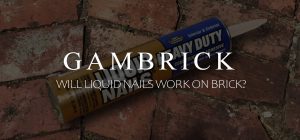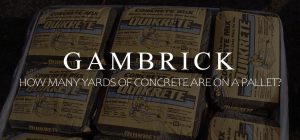
Will Liquid Nails Work On Concrete?
I’ve been a builder for over 25 years and can tell you firsthand that Liquid Nails works on concrete. Liquid Nails construction adhesive will fasten wood to concrete as long as the conditions are right and you use the right type of Liquid Nails. The ideal conditions include: surfaces must be clean, dry, and dust-free, and the application temperature must be between 40–100° F (5–38° C), and you have to use a Liquid Nails that says for use on Concrete. Some of their products are for things like particle board and lighter objects. I recommend using Heavy Duty Liquid Nails model LN-950 Polyurethane Adhesive. The hold is very strong and it’s easy to work with. It’s thicker than the other types and really sticks hard.
It’s difficult to find a product that sticks to concrete. Most adhesives chip, flake, peel, and fall off after a short time. But Liquid Nails is a fantastic product that can stick to just about anything, provided conditions are right and you buy the correct formula.
They have a wide range of products that are meant for different applications and materials with varying strength limits. When fastening to concrete, I recommend using their high strength products, especially if the project is outdoors. The bond is strong and it sets fast when compared to other types of glue.
What I really like to do is use a combination of Liquid Nails and mechanical fasteners like screws and anchors. First I use Liquid Nails. Once it’s set, I drill holes and attach my screws or anchors. Since the adhesive holds the material in place, I don’t have to worry about it shifting as a drill. This makes work easier and more accurate.
How Long Will Liquid Nails Stick Wood To Concrete?
If you’re attaching wood to concrete with an adhesive like Liquid Nails, it’s important to understand the limits of the product.
Using adhesives like Liquid Nails to fasten wood onto concrete is a viable long term option given the appropriate conditions. However, the climate, temperature and humidity are all major factors in determining the longevity of an adhesive’s bond between wood and concrete. Adhesives definitely aren’t as reliable as a screw or other concrete anchor. But given the right circumstances they can last a very long time.
It also depends on what type of Liquid Nails you use. Their high strength formulas last a lot longer and you must use a waterproof and weather resistant adhesive when working outdoors.
Moisture is a big factor. Wood can expand and contract over time with changes in temperature and moisture. If the wood you glue to concrete gets wet a lot or is exposed to the freeze/thaw cycle then it probably won’t stick as long. Movement caused by moisture soaking into and then evaporating out of the wood not only damages the wood over time but also weakens the adhesive bond.
If you glue wood, or any other material, to concrete in a controlled environment where it doesn’t get wet and temperatures are more steady, you can expect a much longer hold from the adhesive. Without outside forces weakening Liquid Nail’s bond there’s no reason why it should fail prematurely.
It’s hard to say for sure exactly how long wood glued to concrete with Liquid Nails will last because there are so many variables. But I’ve done it many times with great success and the wood stayed tight for years.
Click HERE to buy Liquid Nails Fuze It Adhesive on Amazon. Or you can find it at Home Depot, Lowes and most hardware stores.
Click HERE to buy Liquid Nails Heavy Duty Construction Adhesive on Amazon. Or you can find it at Home Depot, Lowes and most hardware stores.
The Best Liquid Nails For Concrete
Liquid Nails adhesive comes in a bunch of different varieties. But there are only two that I use for bonding things to concrete.
The very best Liquid Nails for bonding things to concrete is called Fuze It Max. I use it for just about everything. It’s one of the best adhesives on the market for bonding just about anything. It’s super strong, dries fast and is real sticky. The thinner versions of Liquid Nails don’t work as well on concrete or as fast.
I don’t have a link for Fuze It Max but here’s one for Liquid Nails Fuze It. It’s a little weaker than Fuze It max but still one of the best adhesives you can buy for concrete.
The next best Liquid Nails for bonding things to concrete is called Heavy Duty. It’s not as good as Fuze It Max but it’s about half the price. For the money you really can’t beat it. The adhesive is really thick, sticky, strong and bonds quickly.
You can buy Liquid Nails Heavy Duty Construction Adhesive at Home Depot, Lowes and most hardware store or on Amazon by clicking the link above.
Best Adhesive For Gluing Wood To Concrete?
There are a lot of construction adhesives on the market so it can be hard to know which is best. And honestly there are a few really good ones out there. But I like Liquid Nails heavy duty. I always keep a few tubes on every job we do. It’s great for all sorts of applications including gluing wood to concrete. Which I think it’s the best at. They have a wide range of products that suite all sorts of applications. Although i tend to overkill things and just use the heavy duty stuff for everything.
- For light to medium duty applications, an adhesive like Liquid Nails works great. It depends a lot on the conditions and the stress that will be placed on the wood but for me,Liquid Nails has always worked.
- Gluing heavy wood to concrete works best with an epoxy based or polyurethane based construction adhesive. Because of how wood expands and contracts from moisture and heat, only the strongest of adhesives should be used when the loads are heavy. These types of adhesives are generally not sold in stores and are considered industrial strength.
One of the best adhesives for gluing wood to concrete is the LN-950 polyurethane adhesive by Liquid Nails. It’s very strong and works in high temperatures.
When wood is glued to concrete it can warp and twist over time because of expansion and contraction forces. When a weak adhesive is used, these forces can pop the wood right off the concrete. Epoxy resins dry into a waterproof, plastic like composite that can better deal with these stresses. This makes them a better option for outdoor applications. However, in places where these stresses aren’t present, such as indoors, Liquid Nails works great.
In light duty applications silicone based adhesives will sometimes work. Silicon works well because it’s flexible and repels water but the bond isn’t that strong. I don’t use them that often but for small projects they come in handy.
Can You Use Liquid Nails On Cement Board?
Liquid Nails works great when the conditions are just right. For dry, clean, and light to medium duty applications I really like it. But for heavier installations or where there will be moisture or temperature fluctuations I prefer mechanical anchoring. In my opinion nothing beats a good concrete screw or anchor.
Over time adhesives can dry and become brittle, which makes them lose adhesion. From what I’ve seen this is a problem when the climate is wrong. I try to only use adhesives in dry areas that are controlled.
What I really like to do is use a combination of mechanical fasteners with Liquid Nails. For example, if a cement board panel would normally call for 20+ screws I’ll use 8 with Liquid Nails. This gives me a nice tight bond from the screws with more hold and stability from the adhesive.
According to the Liquid Nails, the Extreme Heavy Duty Construction Adhesive LN-907 is recommended for the following materials:
- Interior Imitation Stone
- Particle Board
- 1/8″ MDF Paneling
- Interior Brick Veneer
- Ceiling Tiles
- Cement Board
- Drywall
- Foam Board
- Plywood
- Tile Board
- Lumber
- Wafer Board
LN-907 Liquid Nails is recommended for cement board and most other common building materials. The application temperature is from 22 to 120 Fahrenheit and the service temperature is -20 to 140 degrees Fahrenheit. This makes it ideal for just about any DIY project and on most construction projects. As a Home Builder I use Liquid Nails on just about every job. there always seams to be something I have to glue together so I keep tubes in every truck just in case.
I always use the strongest adhesive I can get. Even for light duty projects. You may think it’s light duty, but someday somebody may tug on your project and you’ll be glad for the extra strength. The heavy duty stuff also tends to set up faster because it’s thicker and stickier which is great when I’m on the job and don’t have much time
What Is The Best Glue For Concrete?
In my opinion, the best overall product for gluing concrete and wood is the LN-950 Polyurethane Adhesive by Liquid Nails. It’s great for light and medium duty projects, readily available and not too expensive. Industrial adhesives are stronger but you have to special order them and they cost a lot more. As a Builder and DIY specialist I like things I can pick up at my local Home Depot.
Liquid Nails works well for dry, clean, and light to medium duty applications. However, for heavy installations I recommend using mechanical fasteners like screws and anchors. I also really like to use a combination of glue and fasteners.
Make sure conditions are right for glue. if there’s a lot of moisture or big temperature fluctuations then I’d recommend some screws.
According to the Liquid Nails, the Polyurethane Construction Adhesive LN-950 is recommended for the following materials:
- Concrete & Stone
- Granite & Marble
- 1/8″ MDF paneling
- Brick Veneer
- Plywood
- Cabinets
- Ceramics & Mirrors
- Composite Materials
- Countertops
- Drywall
- Foam Board
- Metal Studs
- Particle Board<strong
- Plastics & Vinyl
- Wafer Board
- Sub Floors
- Tile Board
- Lumber
- Rubber
- Aluminum
This stuff really does a great job at sticking things together. And you’ll notice that also includes wood and concrete. It’s a great all around product and I really like how fast it sets up. As I’ve said earlier, I always use the strongest glue I can get. It sets up faster which is a huge help on the job.
The Best Way To Stick Wood To Concrete
In my opinion, the best way to attach wood to concrete is by using a combination of adhesive and mechanical anchors. I really like the two together. The anchors provide more strength and a safety net in case the adhesive gives out. The glue provides more hold and stability while you install the anchors.
Glue can also be a form of water proofing behind the wood. If you use the right kind it’ll be waterproof which diverts water away from the wood.
I like to fasten my wood to concrete with Liquid Nails first. Once it’s set up and secure I drill my pilot holes and then attach my screws or anchors. The stability and hold the Liquid Nails gives me is so great. I don’t have to worry about my wood shifting out of place because the adhesive holds it tight. This method makes pre-drilling much easier. Once all the holes are drilled I attach my screws or anchors. Don’t secure them too tight because you could break the wood or glue hold. A snug fit should be fine for most objects.
Summary: Will Liquid Nails Work On Concrete?
When you need to stick wood onto concrete but don’t want to use a nail or screw what are the alternatives? Will Liquid Nails work on concrete? The answer is yes. Liquid Nails construction adhesive will fasten wood to concrete as long as the conditions are right and you use the right type of Liquid Nails. The ideal conditions include: surfaces must be clean, dry, and dust-free, and the application temperature must be between 40–100° F (5–38° C). And you have to use a Liquid Nails that says for use on Concrete. Some of their products are for things like particle board and lighter objects. I recommend using Heavy Duty Liquid Nails model LN-950 Polyurethane Adhesive. The hold is very strong and it’s easy to work with. It’s thicker than the other types and really sticks hard.
Liquid nails is a fantastic product that can stick just about any two surfaces together. They have a wide range of products that are meant for different applications and materials with varying strength limits. When fastening wood to concrete I recommend using their high strength products, especially if the project is outdoors. The bond is strong and it sets fast when compared to other types of glue.
What I really like to do is use a combination of Liquid Nails and mechanical fasteners like screws and anchors. First I attach the wood with Liquid Nails. Once it’s set I drill holes and attach my screws or anchors. Since the adhesive holds the wood tight I don’t have to worry about it shifting out of place as a drill. This makes work much easier and more accurate.
If you have any questions or comments about Quikrete E-mail any time.

John Mazzuca | About | More Posts |
Custom Home Builder
John Mazzuca is a custom home designer and builder at Gambrick with over 25 years experience in the construction industry. John has designed, built and/or remodeled hundreds of homes, small buildings, and commercial projects. He writes about business, real estate, home building, and household electronics. His work has been featured in Fox Business, Better Homes & Garden, House Beautiful, and more.






















